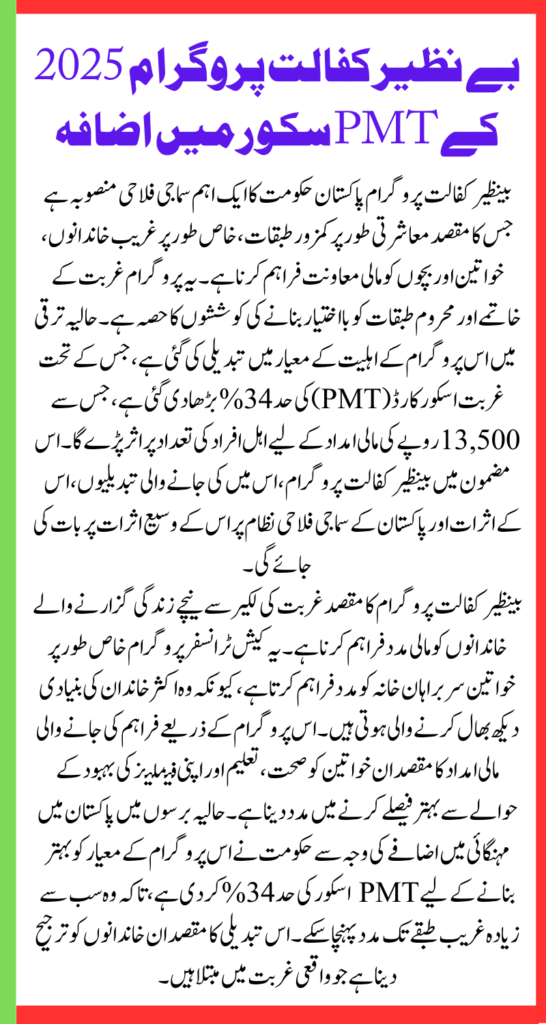Benazir Kafalat Program 2025 PMT Score Increase
Benazir Kafalat Program 2025 PMT Score Increase The Benazir Kafaalat Program is a significant social welfare initiative launched by the Government of Pakistan. It aims to provide financial support to the most vulnerable sections of society, specifically low-income families, women, and children. The program is part of a broader effort to alleviate poverty and empower disadvantaged communities in the country. In the latest development, the eligibility criteria for the program have been revised, with the Poverty Scorecard (PMT) score threshold raised to 34%, thereby impacting the number of individuals eligible for the financial assistance of 13,500.
This article explores the Benazir Kafaalat Program, the recent changes in its eligibility criteria, the impact of this shift on recipients, and the broader implications for Pakistan’s social welfare system.
You Can Also Read: BISP Launch Instant Payment Widrawal Service Through Bank Accounts In January 2025

Overview of the Benazir Kafaalat Program
Benazir Kafalat Program 2025 PMT Score Increase The Benazir Kafaalat Program is an initiative aimed at providing financial assistance to households living below the poverty line. This cash transfer program, named after former Prime Minister Benazir Bhutto, focuses on poverty alleviation by directly transferring money to women heads of households, as they are often the primary caregivers. The primary objective is to enable these women to make informed decisions about their families’ health, education, and overall well-being.
Launched under the Ehsaas Program, the Benazir Kafaalat Program is one of the core components of the Ehsaas Poverty Alleviation Initiative, which aims to support over 10 million families. The financial assistance provided through the program is meant to address basic needs and improve the quality of life of beneficiaries, many of whom live in rural areas where economic opportunities are limited.
What is the PMT Score?
Benazir Kafalat Program 2025 PMT Score Increase The Poverty Scorecard (PMT) score is a key tool used in the Benazir Kafaalat Program to determine eligibility for financial assistance. The PMT is a data-driven model designed to assess the relative poverty levels of households based on various factors such as income, access to basic services, education, and assets.
In Pakistan, the PMT score is used to identify families that are most in need of government assistance. The PMT score is generated through a survey that collects detailed data on households. A higher PMT score indicates a higher level of poverty, while a lower score signifies a relatively better socio-economic status.
Initially, the PMT score was set at a certain threshold for households to qualify for assistance. However, this threshold has been periodically adjusted to better reflect the changing economic realities of the country and the increasing demand for support.
You Can Also Read: Benazir Kafaalat Payment 2025 Starting from January 1st With Extra 3000
Recent Increase in PMT Score to 34%
Benazir Kafalat Program 2025 PMT Score Increase In 2025, the eligibility criteria for the Benazir Kafaalat Program underwent a significant change. The PMT score threshold for eligibility was raised to 34%. This means that only those households with a PMT score higher than 34% will be eligible to receive the cash payment of 13,500 under the program.
This increase in the PMT score reflects an attempt to better target the most impoverished segments of the population. It aligns with the government’s objective of ensuring that social welfare resources are allocated to the families that need them the most.
The decision to raise the threshold is likely due to several factors. One reason is the inflationary pressures Pakistan has been facing in recent years. With rising costs of living, particularly for essential goods and services, the government may have decided that a higher PMT score would better capture the households that are most at risk of falling deeper into poverty. Additionally, the increase in the PMT threshold is a response to the growing demand for government support, as the economic situation has worsened for many citizens.
You Can Also Read: Ehsaas Program 12000 Online Check 8171 Portal And SMS Way
Impact of the PMT Score Increase
Benazir Kafalat Program 2025 PMT Score Increase The increase in the PMT score to 34% will significantly impact the Benazir Kafaalat Program and its beneficiaries. By raising the threshold, the government is narrowing the pool of eligible beneficiaries, which may exclude some households previously receiving aid. This reduction, though potentially harsh, is aimed at ensuring the program’s long-term sustainability by focusing resources on the poorest families. The change also ensures that assistance is more targeted at those in extreme poverty, but it could lead to increased competition among the poorest for limited resources, creating pressure on the program’s budget.
Rural communities, which often face harsher economic conditions, may be disproportionately affected by the higher PMT score, potentially leading to greater hardship in these areas.
Broader Implications for Pakistan’s Social Welfare System
The increase in the PMT score for the Benazir Kafaalat Program presents challenges for Pakistan’s social welfare system, particularly in maintaining sustainability. With fewer beneficiaries, there may be pressure on public finances despite high demand for social services. To address this, the government must plan carefully and consider strategies like enhancing economic resilience for low-income families to reduce dependence on welfare.
Moreover, the increase highlights the need to tackle poverty’s root causes, such as limited access to education, healthcare, and jobs. Long-term solutions, including investments in infrastructure and job creation, are essential to break the poverty cycle. Improving data collection and monitoring is also crucial to ensure that resources effectively reach the most vulnerable families.
You Can Also Read: BISP Recertification For Eligible People Next 13500 Payment
Conclusion
Benazir Kafalat Program 2025 PMT Score Increase The recent increase in the PMT score for the Benazir Kafaalat Program reflects Pakistan’s ongoing efforts to refine its poverty alleviation strategy. While this change will reduce the number of eligible households, it aims to ensure that resources are directed to those most in need.
However, it also raises important questions about the sustainability of the welfare system, the broader issues of poverty, and the challenges faced by rural communities. Moving forward, the success of the Benazir Kafaalat Program will depend on balancing targeted assistance with broader structural reforms to address the root causes of poverty in Pakistan.
You Can Also Read: Punjab Honhaar Scholarship Stipend Scheme Phase 2 For Students
FAQS
What is the main objective of the Benazir Kafaalat Program?
The Benazir Kafaalat Program aims to provide financial support to low-income families, especially women, to improve their well-being and alleviate poverty.
How is eligibility for the Benazir Kafaalat Program determined?
Eligibility is determined using the Poverty Scorecard (PMT), which assesses factors like income, education, and assets to gauge poverty levels.
What recent change was made to the Benazir Kafaalat Program in 2025?
The PMT score threshold for eligibility was raised to 34%, meaning only households with a score above this will qualify for the financial assistance.
How will the increase in the PMT score affect the program’s beneficiaries?
The increase will narrow the pool of beneficiaries, potentially excluding some households and making the assistance more targeted to those in extreme poverty.
What are the broader implications of this change for Pakistan’s social welfare system?
The change highlights the need for sustainable social welfare programs, long-term poverty solutions, and improved data collection to ensure assistance reaches those most in need.
